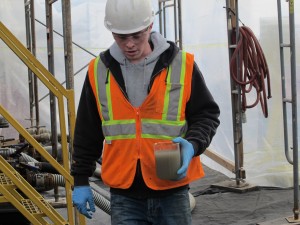Chloride Levels Remain Unregulated in Pennsylvania Waters

Susan Phillips / StateImpact Pennsylvania
A worker collects a water sample at a natural gas wastewater recycling plant in Susquehanna County. Drillers have begun recycling wastewater, but some say pollutants from natural gas drilling is still finding its way to the state's rivers and streams.
More than two years after the New York Times revealed how poorly equipped wastewater treatment facilities were discharging toxic substances from natural gas drilling into Pennsylvania’s rivers and streams, the state still has no water quality standards for chloride and sulfates.
On Thursday, the state’s Independent Regulatory Review Commission, or IRRC, approved new water quality standards for pollutants like strontium. But chloride and sulfates were not included in the more than 100-page revision. The state’s water quality standards are updated every three years as required by the federal Clean Water Act.
Pennsylvania’s Department of Environmental Protection had originally proposed adding chloride, sulfates, and a chemical known as molybdenum, to the state’s water quality standards. But opposition came from miners of molybdenum, the coal industry, and the natural gas industry. Coal mining, along with other industries, generates sulfate discharges. Molybdenum is a heavy metal mined for use in steel and cast iron.
Despite efforts by environmental groups concerned about increased natural gas drilling activity, and resulting discharges of chloride, the DEP withdrew the chloride from the original proposal.
“We think that it’s important to have a standard to protect fresh water species, especially with oil and gas wastewater produced in such large amounts,” says Myron Arnowitz from Clean Water Action. “The DEP records indicate that there’s significant amounts of oil and gas wastewater discharged in some places.”
In April 2011 the industry agreed to voluntarily stop sending wastewater to sewage treatment facilities. But Arnowitz says even DEP officials told the IRRC Commissioners at a recent meeting that some oil and gas waste still finds its way into Pennsylvania’s waterways. Non-Marcellus gas drilling activity continues to produce wastewater that is sent to municipal treatment facilities.
That wastewater has a high salt content. In it’s original proposal, DEP pointed to increased oil and gas production as a reason to establish standards for chloride, describing its potential impacts on aquatic life.
“Freshwater fish and aquatic communities cannot survive in elevated concentrations of chlorides. Maintaining a proper salt-to-water balance in a fresh water environment challenges most aquatic life and, in particular, aquatic insects.”
A spokesman for the Department of Environmental Protection, Kevin Sunday, says the agency continues to monitor chloride discharges, and may propose chloride standards in the future.
“DEP is committed to continue to evaluate the developing science on chlorides,” wrote Sunday in an email, “and will – if substantiated – recommend a water quality criteria for chlorides to the EQB [Environmental Quality Board], possibly independent of PA’s next triennial review rule making.”
The Pennsylvania Chamber of Business and Industry opposed those new standards, submitting public comments that the water quality standards would place an economic burden on industry and the DEP lacked sound science to justify the change. In public comments, Consol Energy makes the case against the new standards for chloride.
“PA DEP, in its rationale for the development of ambient water quality criteria for chloride, identifies flow back water resulting from the gas well drilling process as demonstrating the need for chloride criteria,” wrote Consol manager for environmental chemistry and design Robert Hartman, in comments dated August 14, 2012.
“Although flow back water contains higher concentrations of dissolved solids, of which chloride is one component, in Pennsylvania, the oil and gas industry operates in a zero discharge mode thus achieving protection of the freshwaters of the Commonwealth through a best management practices approach. This would seem to negate the need for chloride water quality criteria based on the assumption that oil and gas industry fluids will be discharged to nearby surface waters.”
Despite arguing that the industry operates a “zero discharge mode,” Consol’s Hartman also says the inclusion of water quality standards for chloride, and other chemicals, would result in high costs to industry.
“CONSOL believes with respect to new criteria for chloride, sulfate, molybdenum, and strontium that this financial burden could be in the billions of dollars to industry.”
StateImpact contacted Consol in an attempt to clarify their comments, but did not receive a reply by press time. The Marcellus Shale Coalition, an industry group, did not weigh in on the issue with any public comments on the water quality standards update.
Although the DEP withdrew the standards for chloride, sulfate and molybdenum (a chemical not associated with the natural gas industry), new standards for strontium, associated with several industrial activities as well as drilling wastewater, and 2-butoxyethanol, a component in frack fluid, did remain in the new criteria approved by the Independent Regulatory Review Commission.
The IRCC is made up of five members, two each appointed by the legislative caucuses, and one by the governor. The vote on these new water quality standards was strictly along party lines, with the Democratic appointees who favored standards for chlorides and sulfates voting down the package. If the Commission had voted no, it would have been sent back to the DEP for revision.
















